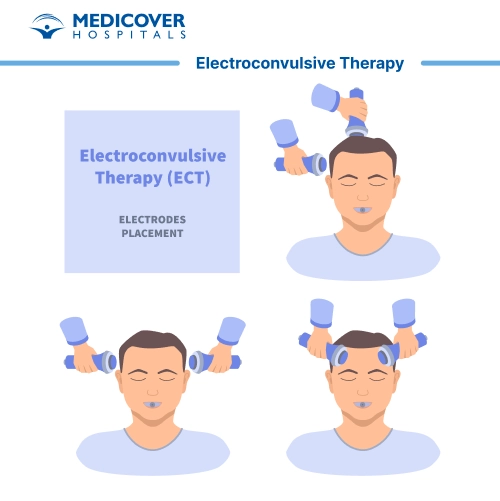What Is Electroconvulsive Therapy?
Electroconvulsive Therapy (ECT), also called electroconvulsive therapy for depression, is a treatment used for serious mental health problems like severe depression, bipolar disorder, or schizophrenia. During the procedure, the person is given anesthesia so they are asleep and do not feel pain. Small electrical currents are then passed through the brain to trigger a short, controlled seizure.
This process helps reset brain activity and improve mood and thinking. Electroconvulsive therapy ECT is usually advised when medicines or therapy do not bring enough relief. It is safe, done by trained doctors, and patients are carefully monitored at every step.
Though the idea may sound scary, ECT has been used for many years and often works well for people who have not improved with other treatments.
Types of Electroconvulsive Therapy
Electroconvulsive Therapy (ECT) can be given in different ways depending on how the electrical currents are applied to the brain. The main types are:
Bilateral ECT
In this method, electrodes are placed on both sides of the head. It is one of the most common forms of ECT and usually works quickly. However, it may cause some short-term memory problems.
Unilateral ECT
Here, electrodes are placed on only one side of the head, usually the right side. This type may have fewer memory side effects but sometimes needs more sessions to be effective.
Bifrontal ECT
In this approach, electrodes are placed on the front part of the head. It is often used to balance effectiveness with fewer side effects compared to bilateral ECT.
Each type of ECT is chosen based on the person's health condition, treatment goals, and response to therapy. Doctors carefully decide which method will give the best results with the least side effects.
5 to 10 minutes per session
Surgery Duration
General Anesthesia
Anesthesia Used
2 to 4 weeks for full benefit
Full Recovery Timeline

When is Electroconvulsive Therapy Recommended?
Electroconvulsive Therapy indications include can be a life-changing treatment when certain mental health conditions do not improve with other options. Based on medical guidance, here are the main situations where ECT is often considered:
- Severe Depression Not Responding to Medication or Therapy: ECT is recommended when antidepressants or counseling have not brought enough relief, especially if symptoms are long-lasting or disabling.
- Severe Suicidal Thoughts or Risks: When a person is at immediate risk of harming themselves, ECT can act quickly to reduce suicidal thoughts and stabilize mood.
- Bipolar Disorder with Extreme Mood Episodes: For individuals with severe mania or depression linked to bipolar disorder, ECT can help restore balance and reduce extreme emotional shifts.
- Treatment-Resistant Schizophrenia or Catatonia: ECT may be used for people with schizophrenia showing severe symptoms like catatonia, aggression, or when medicines fail to help.
Preparing for Electroconvulsive Therapy Procedure
Preparing well for your Electroconvulsive Therapy (ECT) sessions helps ensure safety, comfort, and a smoother treatment experience.
Medical Evaluation & Pre-ECT Visit
- Review your full medical history, current medications & overall health.
- Routine tests like blood work, ECG or other assessments may be done to ensure you are ready for ECT.
- Bring all results to your doctor ahead of time to finalise scheduling and discuss any concerns.
Health Habits & Lifestyle Adjustments
- Avoid alcohol and recreational drugs for at least a few days before treatment.
- Follow your doctor's instructions regarding medications that may affect anesthesia or seizure threshold.
- Maintain a balanced diet and stay hydrated to support your overall health and recovery.
Prepare Your Home and Support System
- Arrange for someone to accompany you to and from the hospital.
- Set up a comfortable recovery space with essentials like water, medications, pillows and easy-to-reach snacks.
- Plan for light support at home for a day or two after your ECT session, especially if you feel drowsy or tired.
The Day Before & Day of ECT
- Follow fasting instructions given by your doctor, usually no food or drink for several hours before the procedure.
- Take a shower and follow any hygiene guidelines provided by your medical team.
- Wear comfortable clothing and avoid jewelry, makeup, or perfumes when coming in for your session.
What Happens During an ECT Procedure?
The ECT procedure is carried out with precision to ensure patient safety and efficacy:


- Anesthesia: Short-acting general anesthesia is administered to induce a temporary state of unconsciousness and muscle relaxation.
- Electrode Placement: Electrodes are strategically positioned on your scalp to deliver controlled electric currents to specific areas of your brain.
- Seizure Induction: The electric currents cause a carefully controlled seizure, which typically lasts for a brief period.
- Monitoring: Throughout the procedure, your heart rate, blood pressure, and oxygen levels are closely monitored by medical professionals.
Who Performs Electroconvulsive Therapy (ECT)?
- A psychiatrist decides if ECT is right for you and leads the treatment.
- An anesthesiologist gives you medicine to help you sleep during the procedure.
- Nurses help you before, during, and after the treatment.
- A technician makes sure the equipment works properly.
Recovery After Electroconvulsive Therapy Procedure
Recovering from Electroconvulsive Therapy (ECT) is gradual, and following your doctor's guidance makes all the difference.
First Few Hours After ECT
- Right after the session, you may feel drowsy, confused, or slightly disoriented. This is normal and usually lasts a few minutes to an hour.
- Gentle rest in a quiet environment helps your mind and body adjust.
- Avoid driving, operating machinery, or making major decisions for the rest of the day.
Doctor's Tip: "Take it slow and let your body rest; short-term memory changes are common immediately after ECT."
Day 1 to 3
- Fatigue, mild headache, or temporary memory lapses may continue for a day or two.
- Light activities like walking or simple household tasks are safe but avoid strenuous work.
- Stay hydrated and maintain balanced meals to support recovery.
Doctor's Tip: "Your energy will gradually improve. Keep a calm routine & rest whenever needed."
Weeks 1 to 2
- Most patients start feeling more alert and stable in mood.
- Memory may slowly improve, though short-term memory lapses can persist for a few days.
- Regular follow-ups with your psychiatrist help track progress and adjust treatment if needed.
Doctor's Tip: "Continue your usual activities but pace yourself. Avoid stressful situations in the first week after ECT."
Weeks 3 to 4
- Mood improvements become more noticeable, especially in depression or bipolar disorder.
- Many patients can resume normal daily routines, work, or social activities.
- Ongoing mental health support and counseling enhance long-term benefits.
Doctor's Tip: "Consistency is key-follow your prescribed treatment schedule and attend follow-ups for best results."
1 to 2 Months Post-ECT
- Most people experience significant symptom relief, with better emotional stability and daily functioning.
- Memory and cognitive functions usually return to baseline.
- Some patients may require additional ECT sessions or maintenance therapy depending on their condition.
Doctor's Tip: "Recovery continues even after sessions end. Monitor mood changes and communicate with your healthcare team regularly."
Benefits of Electroconvulsive Therapy
- Improves mood and emotional balance: ECT can help people with severe depression, bipolar disorder, or other serious mental health conditions feel more stable and emotionally balanced.
- Reduces suicidal thoughts quickly: For individuals at risk of self-harm, ECT works faster than many medications, lowering dangerous thoughts & improving overall safety.
- Effective when medications do not work: ECT is a proven option for people whose symptoms do not improve with antidepressants or therapy, offering a reliable path to relief.
- Supports everyday functioning: By improving mood, focus and energy, ECT helps people manage daily tasks, return to work and engage in social activities more easily.
- Sustained benefits with follow-up care: With proper follow-up sessions and ongoing mental health support, the positive effects of ECT can last for months, helping maintain well-being.
Risks of Electroconvulsive Therapy
While electroconvulsive therapy side effects are usually mild, it is important to be aware of potential risks:
- Short-term memory loss
- Confusion or disorientation after treatment
- Headache or muscle aches
- Nausea
- Heart-related effects in patients with pre-existing conditions
- Anesthesia risks
- Rare complications
What is the cost of electroconvulsive therapy in India?
The cost of Electroconvulsive Therapy (ECT) typically varies based on the number of sessions required, the complexity of the treatment, and the hospital facilities. At Medicover, the cost per session generally ranges from Rs. 3,000 to Rs. 6,000.





























